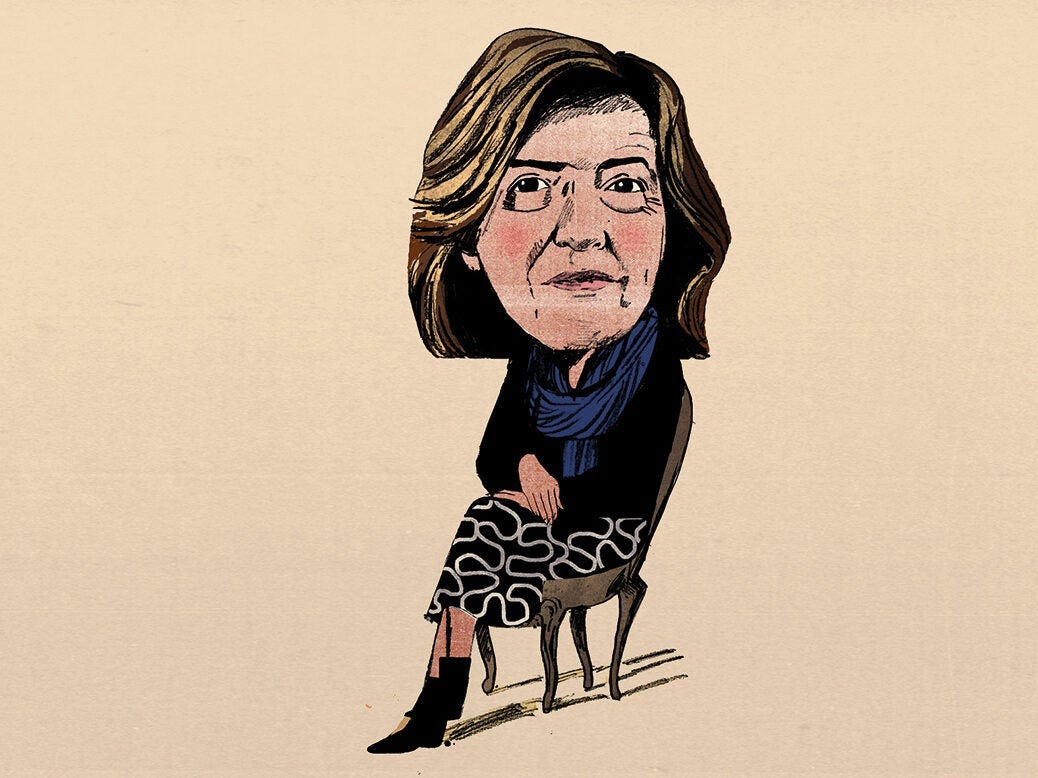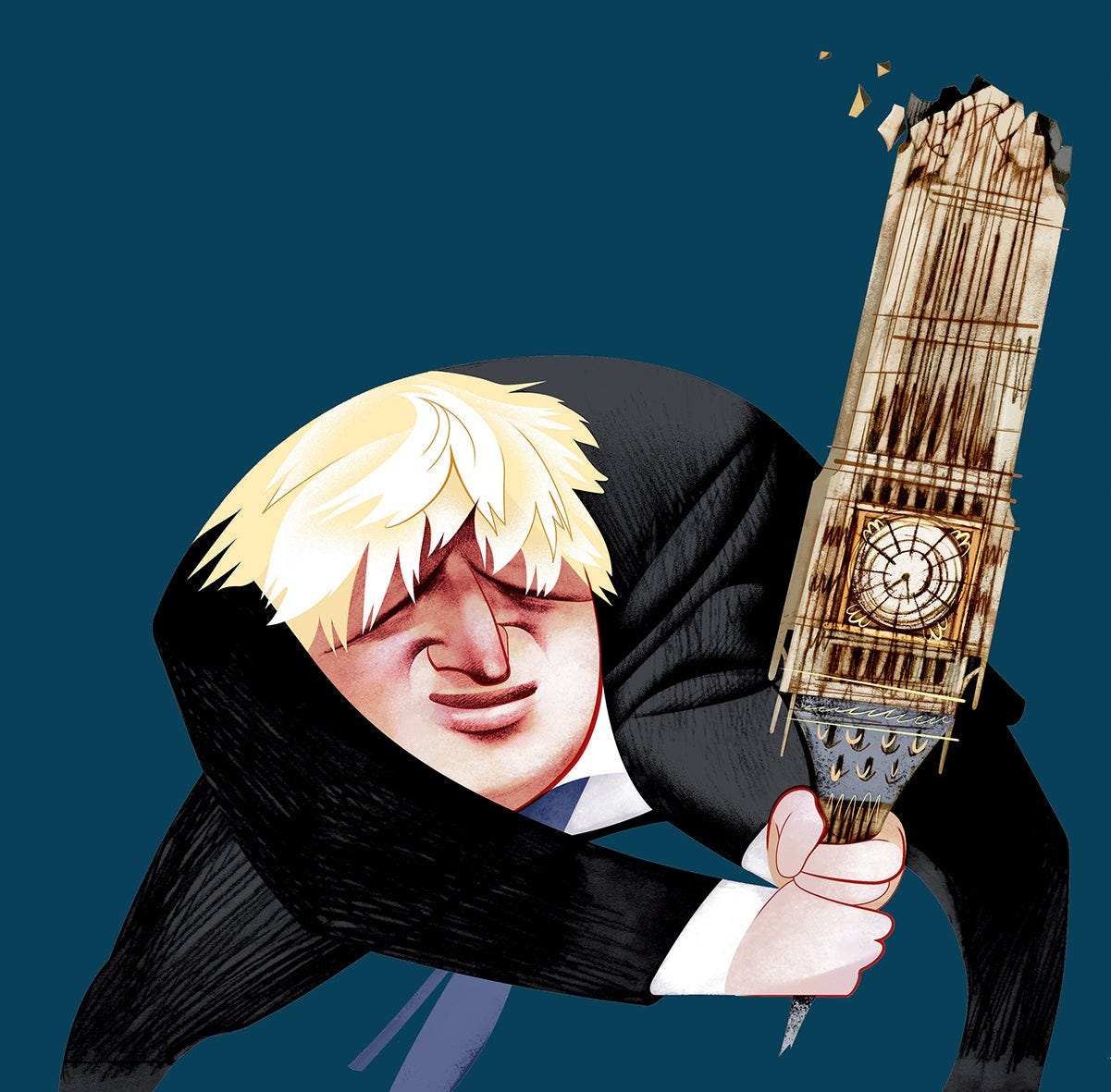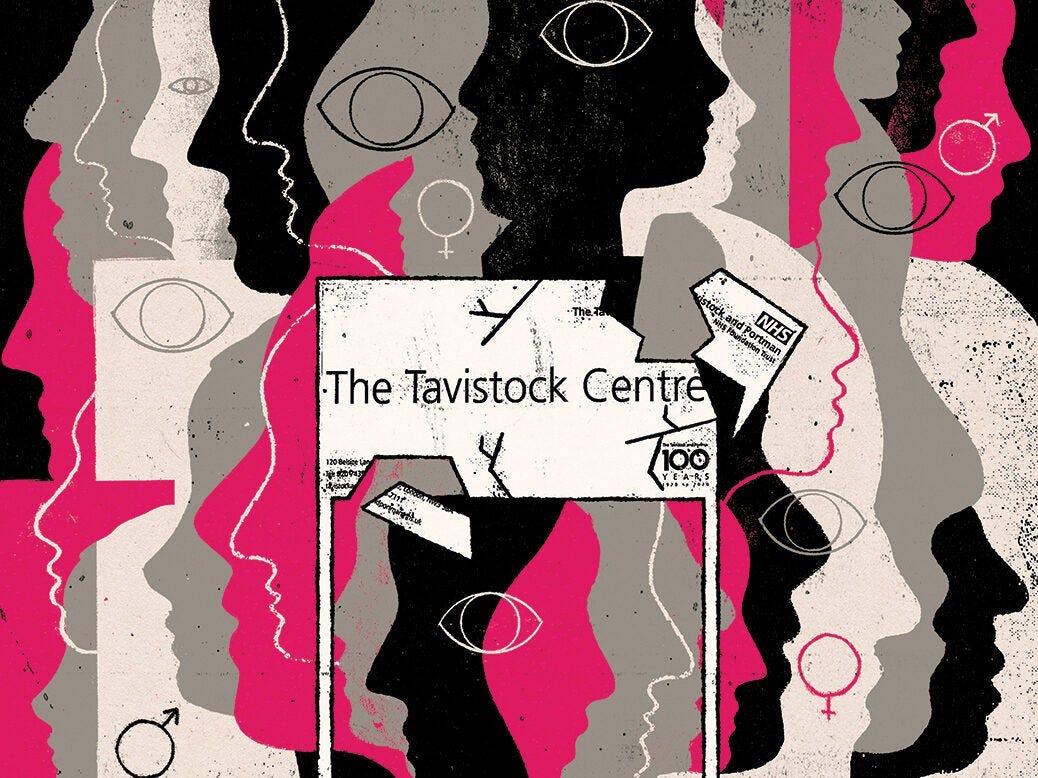The Saturday Read: Closing out
Inside: Two coming powers, Carrie, Dune, Israel, Ireland, and a departure.
Good morning. Welcome to the Saturday Read, the New Statesman’s weekly guide to politics, culture, books, and ideas. This is Harry, along with Pippa and George.
The great Will Lloyd, with whom I started this newsletter, is heading west. He has signed off in superb style at the end of today’s SR. He has reflected on writing to you each week and on his time at the NS. Don’t miss it. He has also filed a final lead for us.
We start off with two pieces on two women who are soon set to be among the most powerful in British politics. Both of them will be taking on roles which no woman has held before them. We also have a bountiful crop of pieces from our spring issue. We hope you enjoy them and find something engaging, even enlightening, in today’s run.
1—“Sue Gray, who has grown more, not less, radical with age, had decided to disrupt the system.”
Hidden power is always a sexy story, even in British politics where most of the participants have faces that could double for loaves. Keir Starmer’s chief of staff – a title imported from the United States by New Labour – is Sue Gray. She doesn’t like the media very much. Unfortunately her position in the next government means the media will like her a great deal. I’ve been looking into her varied career. Here is what I’ve found. WL
In December 2021, Gray took over the partygate investigation after the Cabinet Secretary, Simon Case, recused himself. Accusations about what happened in that investigation and its subsequent fallout continue to be made by allies of Boris Johnson. Some of these claims, were they ever made public, would be major national news. It is not hard to find senior Tories, including former cabinet ministers, who are critical of Gray’s conduct and her intellect. One told me that the partygate report was “the shabbiest piece of work ever”. They suggested Gray was employed by the secret services (which Gray denies) during the time she ran a pub near the Irish border at the height of the Troubles: “You don’t spend a year running a pub in bandit country for a career break,” they said. “Definitely a spook.”
Gray’s supporters believe she was badly treated by the civil service and the “shockingly poor management” of Case. “She hates Simon,” said one. Gray is expected to shuffle Case out of the Cabinet Office and replace him with Olly Robbins if Labour takes power. Perhaps the most important legacy of the partygate mess is that it sharpened Gray’s disappointment with the system she had spent a professional lifetime defending.
2—“Reeves outflanked not just Thatcher but New Labour.”
On Tuesday Rachel Reeves delivered her Mais Lecture, an economic address previously given by Nigel Lawson, Tony Blair, Gordon Brown, George Osborne, and Rishi Sunak when people still liked him. Matthew Parris has derided it as a “shapeless wordfest” in today’s Times. But George Eaton sees significance in her speech. Labour have ditched Corbynism. This week Reeves dissented from Blairism. She is firmly to the left of New Labour on public ownership and workers’ rights. In fact, her plan looks a lot like Joe Biden’s. The issue is, our coffers don’t look at all like America’s. GM
This is far from the only dividing line with New Labour. Public ownership was such a taboo for Blair and Brown that the latter hesitated to nationalise Northern Rock in 2007. An excessive faith in the market – and a desire to keep borrowing off the government balance sheet – also led to profligate PFI contracts. Reeves, however, declared that investment would be “driven by new institutions”: a National Wealth Fund and the publicly-owned Great British Energy (Labour would also renationalise the railways as private contracts expire). Just as Thatcher challenged the Keynesian consensus from the right, so Reeves is challenging the Washington consensus from the left.
3—“I am depressed by the prospect of more lawyers policing politicians.”
Who better to review a book about the ethics of British politics than Marina Wheeler, a barrister and Boris Johnson’s wife from 1993 to 2020? Downward Spiral is John Bowers KC’s “fast-paced, hard-hitting” enquiry into British sleaze and scandal, which he was inspired to write by Johnson’s conduct. Wheeler is intriguingly uneasy about some of his suggested reforms. PB
Bad behaviour and corruption in politics is nothing new. The current ethics architecture was constructed after John Major’s “back to basics” campaign came adrift, Bowers writes, exposing ministerial extramarital affairs (including his own), then the illicit sale of arms to Saddam Hussein’s Iraq and the “cash-for-questions” scandal. To restore integrity, Major convened an ethics commission under Michael Nolan whose report enumerated the “seven principles of public life”: selflessness, integrity, objectivity, accountability, openness, honesty, leadership. New Labour pledged to clean up politics but became mired in scandal too: allegations that peerages were being sold led to Tony Blair being questioned by the Metropolitan Police.
4—“The ill-effects of Maidwell have blighted the whole course of my adult life.”
Charles Spencer’s memoir of his school days at Maidwell Hall boarding school is one of the books of the moment. Andrew Motion, the former poet laureate, attended Maidwell for five years from 1959, a decade before Spencer. He found much that he recognised in Spencer’s book, A Very Private School: casual cruelty, sexual assault, and the course of an adult life marred by “a seriously compromised idea of what love might be”. Who, Motion asks, is to be held responsible? PB
The routine was foully ritualised: each guilty party would be ushered into the headmaster’s study by a prefect, asked to confess, then – depending on the severity of the sentence – either be whacked hard with the heel of a slipper or be told to lower their trousers and underpants, kneel down and submit to being walloped on their bare buttocks with the Flick (a whippy little stick) or the Swish (a firmer item). In extreme cases, it was a cane which had been especially cut from one of the bamboo clumps that sprouted in the grounds.
5—“We broke our contract with the people of Israel on that day.”
Jason reports from Israel, where the prospect of a two-state solution has all but vanished. He captures a mood and a moment. “Later, opening his arms wide, as if in despair, he says: ‘This was Eden!’” HL
The walls and doors of the whitewashed, flat-roofed, three-room apartment we have entered in the “juvenile generation” neighbourhood of Kibbutz Kfar Aza are full of bullet holes. The floor is cratered where a thermobaric grenade exploded. This was Sivan Elkabets’ house, where she and her partner, Naor Hasidim, lived and were murdered on the morning of 7 October. On one of the walls, you can read a transcript of the final WhatsApp messages Sivani sent to her mother elsewhere in the kibbutz: “What is it, mom?/What’s going on here?/Mother… Mom, mother/Let me know every five minutes that you’re okay.”
It’s a warm morning and small, brightly coloured birds flit between the olive trees. Across nearby fields, perhaps a mile away, is the Gaza border; intermittently, you hear the boom of artillery being fired into the Strip.
And, not or – that’s our approach. While today we’re mostly in oil and gas, we increased the proportion of our global annual investment that went into our lower carbon & other transition businesses from around 3% in 2019 to around 23% in 2023. bp.com/AndNotOr
6—“There are now two Irelands.”
In the 2010s, Ireland became the first country to legalise gay marriage by popular vote; it also voted to legalise abortion, and elected Leo Varadkar, its first gay Taoiseach. What, asks Finn McRedmond, happened to that progressive surge? In recent months the country has been hit by riots against immigration and now modest updates to the constitution – updating the definition of marriage, scrapping reference to a women’s “duties in the home” – have been rejected in referenda, leading Varadkar to resign. GM
By 2018 many in Ireland believed that their nation had reached the end of history. The rapid, progressive shifts of the 2010s had seen a weary old Catholic country vote in gay marriage and abortion with the zeal of a convert; in 2018 the electorate celebrated the end to a medieval ban on blasphemy. Unlike supposedly reactionary Brexit Britain, Ireland could revel in a new role as a beacon of liberal values. It was as though “a new world had landed from outer space on top of an old one”, as Fintan O’Toole wrote in his 2021 history of modern Ireland, We Don’t Know Ourselves. The arc of the moral universe was long, but it bent towards justice.
7—“This was clinical practice dictated by feeling, not evidence-based medicine.”
The Gender Identity Development Service (Gids) at London’s Tavistock and Portman NHS Foundation Trust – the focal point of much of the UK’s sound and fury about trans rights – will shut its doors at the end of this month. Hannah Barnes, the issue’s definitive chronicler, explains that the closure is less political than you might think, in a more detailed account of a story we touched on last week. GM
Gender Plus is predominantly aimed at the 16-25 age group, and goes further than the NHS ever has: prescribing hormones to 16-year-olds without the need for prior treatment with puberty blockers. Young people seen at Gids have only ever been able to access testosterone or oestrogen at 16 if they had been on blockers for a year beforehand. Kelly’s colleague, another former Gids clinician, Claudia Zitz, has said that Gender Plus would “definitely” assess 15-year-olds, “so that they can start kind of accessing medical treatment at 16”. The Gender Plus team has publicly stated its opposition to NHS England’s plans to end the routine prescription of puberty blockers.
8—“King captured the ugly, calcified feelings of womanhood.”
Stephen King’s bloody and compulsive debut novel, Carrie, published 50 years ago, was inspired by a suggestion from a friend that he should try to write a female character. This makes its great triumph – “that King somehow knew all about the loathsome ways the anger of a teenage girl can warp and protrude” – all the more remarkable, writes Megan Nolan. PB
Carrie is a frightening book – less frightening, for my money, than what would follow in Cujo, The Shining and Pet Sematary, but substantially more frightening than its (still excellent) film adaptation would render it. Its fantastical elements are delivered with the cool conviction a debut novelist rarely approaches, and the more observational aspects about social exclusion, shame and religiosity are just as assured. But more than these two achievements, what I loved about Carrie when I read it as a teenager – and what affects me even more now I am in my thirties – is the dread of womanhood it instils in the reader, a feeling that underpins even its most outlandish turns. Some of that feeling is overtly drawn, such as the terror of encroaching adulthood and bodily change we feel as Carrie is revolted by her own blood.
9—“The Conservatives would just look self-obsessed.”
‘Nother round, anyone? Certain blood-letting Tories ask. David Gauke shakes his head wearily. Rishi Sunak is a bad politician leading his party to a brutal defeat. But a fourth Tory PM this parliament, squeezed in before the bell rings and a general election is called, would be preposterous. GM
Had he forcefully condemned Truss’s fiscal recklessness (which he warned against in his 2022 leadership campaign) and had he voted for the sanctions against Johnson recommended by the Commons’ Standards & Privileges Committee, he would have provoked his Tory critics but been both gutsy and on the side of public opinion (politicians rarely get the chance to be both at the same time). He could have defined himself favourably at the beginning of his premiership and subsequent moments of equivocation (as every party leader will have from time to time) would have been viewed less harshly.
10—“The fundamental weakness of techno-feudalism is the poverty of its myths.”
My flatmate thought Dune 2, or whatever it’s called, was terrible. I didn’t watch the first one. (You can find me over by the Kubrick archives.) But John Gray sees meaning in Denis Villeneuve’s latest spectacle, featuring “leading man” Timothée Chalamet, who continues to look 16 at the age of 28. Click through for a provocative piece. You never need to watch a film, or like it, to read the best reviews. HL
The warring empires and dynasties of Denis Villeneuve’s visual extravaganza have been derided for their archaism. Yet the film presents a world not unlike the one coming into being around us. It is an axiom of progressive thinking that there can be no irreversible return to the past. Liberal democracy may have run its course, but it will be succeeded by a regime of a kind never before known – an authentic type of socialism, a cosmopolitan egalitarian community or perhaps a technocracy governed by impartial experts. In fact, failing liberal societies are morphing into high-tech versions of feudalism. Dune: Part Two is not a phantasm of the future but an epiphany of the present.
George’s Best of the Rest
BBC: Putin wins landslide. Lost a fiver on that!
Guardian: Garrick Club’s male-only membership revealed.
CNN: Haiti carnage continues.
Al Jazeera: EU and US pile on pressure for Gaza ceasefire.
Tano Santos and Luigi Zingales: How Big Tech undermines democracy. Too long; didn’t read.
Charlie Warzel: Flying is weird right now. Includes the great and questionable factoid that flying is safer than sitting on the literal floor.
Rebecca Jennings: The Mr Beastification of entertainment.
James Marriott: Self-obsession is the root of modern loneliness. It’s going to take a lot more than this to make me give up my journal.
Chris Jesu Lee: Searching for the perfect friend group. Oh for a literary ratpack!
Jonathan Clarke: Your New York, and mine.
Queen Mother’s flat opened, full of guns, all pointing at France. At the ready Ma’am.
Cambodia has had to take measures against excessive dancing in the streets.
Finland happiest country for seventh straight year. But do you see them dancing.
Click here to read this email online if it cuts off prematurely. Let us know what you think of the SR or the issues in question today by replying directly to this email or leaving a comment.
Elsewhere on the NS
Will has also written a short note on the Princess of Wales’s cancer diagnosis: “There will be many resounding, high-flown words about Kate Middleton over the weekend. They will be hollow.”
Jill Filipovic addresses the American cultural breakdown that has allowed Trump’s authoritarianism to flourish.
In the beginning, there were lots of potential Jesuses. John Gray reviews a book on the accidental triumph of Western Christianity.
Katie Stallard returns to unfold a panorama of our planet and its violence.
Conservative Party, meet impending devastation. Andrew Marr makes the case.
In Britain, Realpolitik is giving way to Feelpolitik, writes Armando Iannucci.
Robert Colls reflects on the closure of the church where he buried his father.
This year’s spring reflection, courtesy of Helen Madonald. Try paragraph four for beauty!
Poet's corner: Ian Bostridge turns to Bach’s St John Passion, first performed 300 years ago, while Michael Prodger looks at the last crimes of Caravaggio – head to the National Gallery to see a rare Caravaggio on loan at the moment, plus the National’s own painting.
Sadiq Khan likes to boast, “I’m a winner, I never lose.” David Cameron also used to say that.
Harry Stopes has the week’s boldest headline: “We need a new history of the world.”
What would change if TikTok was banned? Sarah Manavis calls for deeper thought in our tech-addled age.
And with that…
A little over a year ago, Harry and I sent out the first edition of the Saturday Read. The aim was to bring you the very best writing from the New Statesman each week. If you look across the dozens of editions since then, you will find the provocative, insightful, curious, engaged spirit of this title on full display.
We’ve reported from Wootton Bassett and Taipei and Lapland. We’ve interviewed Annie Ernaux, Larry Summers, Tony Blair, Mary Beard, Peter Thiel and dear old Neil Kinnock. Waterstones Dads and cool girl novelists have been thrillingly taxonomised. Julian Barnes, Jeanette Winterson, Richard Dawkins, Gary Younge, Jacqueline Rose, Paul Kennedy, Helen Thompson, John Banville and dozens of other Big Names have provided fresh, reverberating contributions to critical debates. Martin Amis died. John Gray read Bronze Age Pervert. Jason Cowley followed Rachel Reeves to Washington. Slavoj Žižek watched Barbie. We have taken you inside the collapse of Vice and the ruins of the 1922 Committee, along the corridors of private schools, through the world of effective altruism, on board the Bibi Stockholm, and into the trenches of the war between AI’s founding fathers. There has been sex, violence, crime, diaries, historians and the Archbishop of Canterbury. There have been bewildering Trussite plots, whispers about James Forsyth, takedowns of Elizabeth Day and Russell Brand and Matthew Goodwin (and a takedown of JK Rowling that was no such thing, honest), and resonant personal stories, beautifully told. We met Disney adults, God bless them. We learned that Saudi Arabia is buying up the world, that the UK’s tax system is broken, and how to escape a cult. This is one of the funniest interviews I’ve ever read. Understanding how QE ate everything alarmed me.
At all times, we have wanted to know what you think. Do you still read literary fiction? Is Britain still a world power? Which book changed your life? And why, at this late stage, does the UK still have a monarch? Your answers have been as challenging and intriguing as the work we publish. Thank you.
The NS has a few critics right now, as it always has done. Some of these people have experience working inside a magazine. Some of them I wouldn’t trust to sell apples at a fruit stall. But I’m glad they’re critical. If anything, it shows they care enough about the NS to write tweets about it in public, while occasionally pitching their own ideas to us in private too. How much of that criticism looks sensible when placed against the work above – and I could fill pages with reports, interviews, essays and columns of that calibre – comes down to what you think a magazine should do. Delight, entertain, inform, and steal its readers’ attention – that’s probably all a title can ever hope for. The New Statesman does this more, I think, than any other magazine in Britain right now. You can subscribe to it here.
I’m moving on to a new role. I’ve loved working at the NS. It’s been an immense privilege. Thanks again for reading.
If today’s pieces intrigued, you can subscribe to the New Statesman below. Stay up to date with everything from news and analysis to comment, criticism and essays.
Whether you’re looking for a sharp blog or a finely written feature, the New Statesman has you covered. Have a good week, and catch you next Saturday.

























To Will - thank you for your rich contributions. Good luck and every success in your next move.
Love the Saturday Read :)
Good luck Will. The Saturday Read is brilliant and allows me to access NS articles in ‘reader view’ on my phone which isn’t possible in the NS app. Of course the real point is that so much of the writing is brilliant! Keep it coming 😀 Mike K